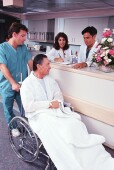
TUESDAY, May 4 (HealthDay News) — A quick follow-up visit by a medical professional to a heart failure patient discharged from the hospital reduces the chance that the patient will wind up back in the hospital, but that preventive measure is more often ignored than observed, a new study finds.
The study of more than 30,000 hospital patients covered by Medicare found that fewer than 40 percent of those with heart failure saw a health-care provider within seven days of discharge, according to a report in the May 5 issue of the Journal of the American Medical Association.
The readmission rate was 15 percent lower for those who did have such a visit, the study found.
A high rate of readmission is a problem for all patients, said study author Dr. Adrian F. Hernandez, an assistant professor of medicine at Duke University School of Medicine in Durham, N.C. The Duke Clinical Research Institute group he led chose to look at heart failure — loss of the ability to pump blood — because it is “a large part of the problem.” People with heart failure generally are older and have other health problems, such as diabetes and arthritis.
Medicare data published in 2009 showed that heart failure is the leading diagnosis for hospital readmission.
Money is a major factor in the readmission issue. “There is currently no direct incentive” for a hospital to report the rate of readmissions, Hernandez said, but the newly enacted health care law calls for a reduction in Medicare payments to hospitals with high readmission rates for heart failure patients, starting in October 2012.
The new study provides support for that measure, Hernandez said.
One question is whether the responsibility for follow-up visits after discharge lies with the hospital or the physician, said Dr. Robert O. Bonow, chief of the division of cardiology at the Northwestern University School of Medicine and a spokesman for the American Heart Association.
“The hospitals argue, why is it their bother?” Bonow said. “They take care of the patients in the hospitals and then hand them off.”
The new study “puts the issue more in the hospitals’ court,” Bonow said. “It argues for the creation of some sort of system leading to patients getting appointments with doctors.”
But it needn’t be a doctor who schedules the follow-up visit, Bonow said. He acknowledged that he usually is too busy to make that visit. “What we do here many times is to have a visiting nurse go home with the patient,” Bonow said. “A visiting nurse seeing the patient may be as effective as seeing a doctor.”
Hospitals should also have “a safety net” that would schedule a visit to a discharged patient if one is not done soon after the hospital stay, Hernandez said.
And people who are leaving the hospital should be sure to ask whether an appointment has been made for a visit by a health-care provider, he said.
The study did find reduced mortality in cases where follow-up visits were done after hospital discharge, Hernandez said. The rate was lower when the visit was made by a cardiologist, but the number of visits was small, “so it is difficult to interpret,” he said.
More information
To learn about heart failure, visit the American Heart Association.

